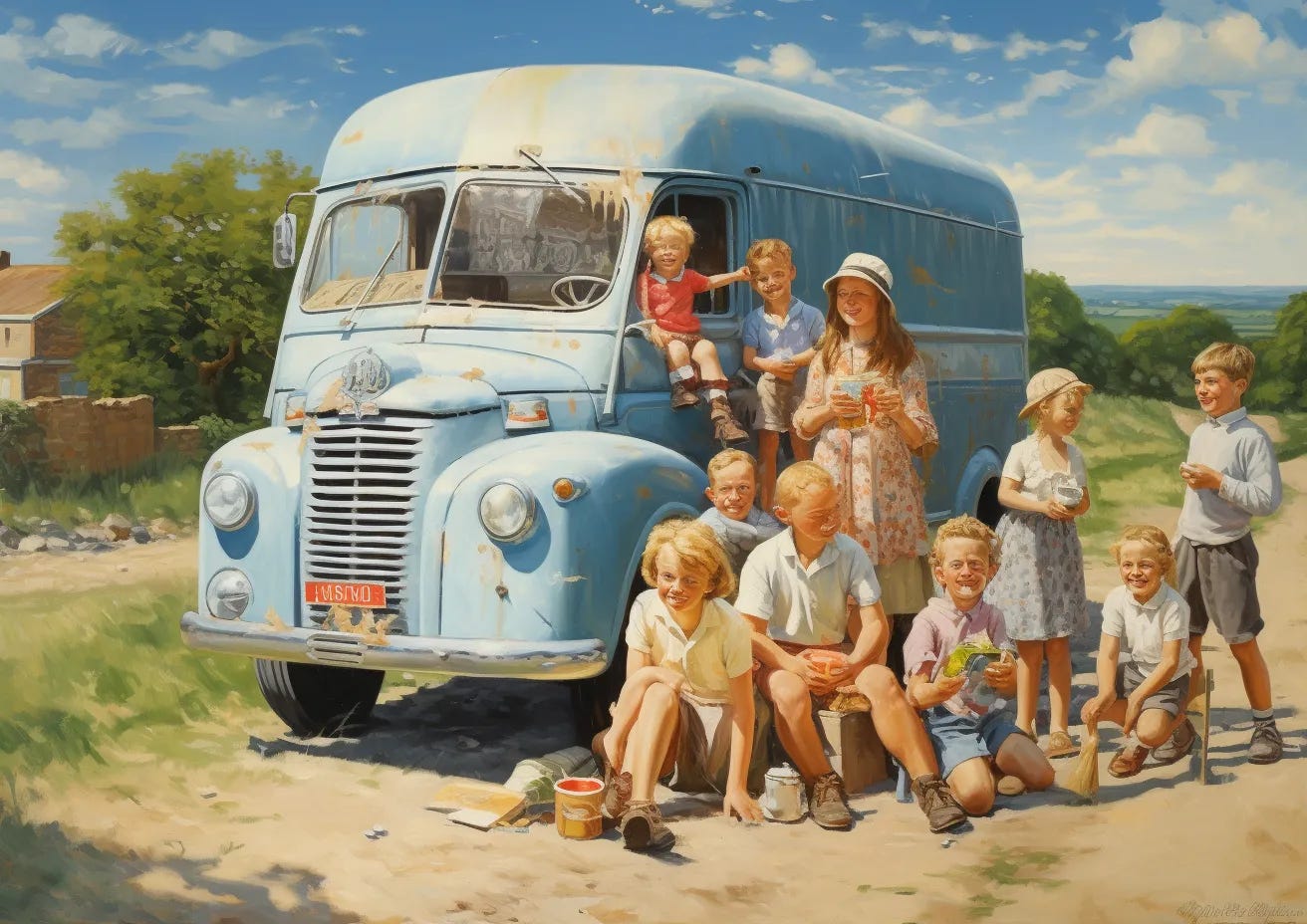Good Sunday morning to you,
Today’s piece is all about decision-making and the decline of family in the west.
Before I crack on, I just wanted to flag a couple of things.
Wearing my comedy hat, I’m taking An Evening of Curious Songs on a mini tour in the spring - shows in London (Crazy Coqs), Somerset, Surrey, Essex and Hampshire. Tickets make great Christmas pressies, so please take a look.
And my new album, It’s ALL True, is out. CDs also make great Christmas pressies for errant uncles, so check that out too in the DF shop.
So to today’s piece - Why so many bad decisions?
I’ve recently been looking at my family tree on one of those ancestry websites, and I was amazed to see just how big some of the families were in 19th and early 20th Century England. Having nine or 10 brothers and sisters was not unusual.
Today, families are much smaller. All sorts of reasons have been proffered for that. Matt Ridley argues that families get smaller as people grow wealthier and live longer. In poorer countries, you might have lots of children, knowing that a significant number will not make it through pregnancy, childbirth and early childhood, let alone the teenage years. With the longer safer lives we now have in the west, you can have two or three kids and know that the likelihood is that they will make it safely to adulthood.
Stat of the day: in 1850, life expectancy in Britain was 40 for men and 42 for women. Today it is double that. Be grateful you are alive in Britain today - you get to live twice as long.
But when parents themselves are asked why they don’t have more children, the most commonly given reason is cost. People ca no’t afford to have more kids. The biggest expense of bringing up a child - government aside (the state takes half of everything you will ever earn) - is somewhere to live. We can no longer afford to buy the large homes our Victorian ancestors built to house their families, so just putting a roof over their head is problem enough. I’ve written endlessly about house prices being a function of cheap, debt-based, fiat money, and it’s quite easy to, therefore, attribute declining family size to fiat.
The average cost of raising a child to 18 is now over two hundred grand. Add in school fees and you can double that number. To age 18, you say. Most kids now stay at home well into their 20s. If you look at who has big families today, it is most unusual to see an ordinary middle-class family with five or more kids. It tends to be only the very rich, who can afford it, the very poor, who get state aid and thus can also afford it (especially if housing is covered), or the very religious.
On that note, my friend Simon Evans argues, and I’m paraphrasing, that we have smaller families because religion has died. One primary purpose of religion is to get you to reproduce, he suggests. Without religion egging us on, many of us will take the sex, but we might forego the added burden of having to bring up the ensuing children.
There’s probably something to all of these explanations. But, whatever the cause, families have got much, much smaller. That is indisputable.
My parents divorced when I was just a few months old. I hardly saw my father at all when I was young due to various court rulings, and that led him to set up an organisation called Families Need Fathers. He wrote about his divorce at great length and to considerable acclaim. My mother worked and I went to boarding school. So I never grew up with lots of brothers and sisters or a big family. It’s a life I’ve never known, without wishing to sound sad, one I’ve always wanted and wished for. How I would love to have been one of HE Bates’ Darling Buds of May (I imagine we all would, though tral life is never as idyllic as fiction).
I only ever knew one of my grandparents, the other three died either before or shortly after I was born. That’s that life expectancy thing again.
So I’m always quite envious when I see, for example, those Asian families with several generations - nanny and grandad, mum and dad and the kids, and perhaps even their kids - all living under the same roof. I know it’s crowded, but it’s also kind of idyllic, particularly if you have a big enough house.
When I travelled round Latin America, I adored those large Spanish Colonial homes built around a courtyard. Different parts of the family could occupy different apartments, so they had some privacy, but at the same time they were always close together.
I once to listened to an audiobook about willpower and decision-making. I’m afraid I can’t remember the name. (This always happens to me with kindle and audiobooks. You don’t look at the cover every time you open it to remind you, so you forget what it is you are reading or listening to). Nevertheless, the author argued that we make different decisions when we are being monitored. For example, if you believe in God and you believe God is all-seeing, the decisions you make will be informed by that. You will be less likely to sin, for example, if you think God is watching. The same applies to CCTV.
Similarly, if you have a large family about you, they monitor and look after you, you are answerable to them, secrets are harder to keep, and that informs the decisions you make.
This is, especially, the case when choosing a partner. Old school families will even have made that choice for you - and they will have often looked for different qualities than you might look for. They are bound, for example, to be thinking more about the long-term good of the family, stability, family alliance, the likely durability of the relationship, the sort of characteristics in a partner that might be good for you - that kind of thing - rather than hotness factor, which might be your main priority, certainly as a young person. Broadly speaking, a decision taken by someone with a strong family infrastructure around them , where brother, sister, mum, dad, uncle, aunt, nan and grandad all have some input, and so their cumulative wisdom is all added, is, more often than not, going to be a better decision than one made by somebody with no family around them .
As you know, the Great Decline of Britain and Western Europe is something that preoccupies me a great deal. I wonder how it is so many bad decisions seem to be made at every level of society, particularly at the top. And such short term decisions too. (I’m not saying I only make good decisions, by the way. I make bad ones. Lots of them). But I would like to venture a possible explanation: the decline of family.
We make more bad decisions without the added wisdom that comes with the infrastructure of family around us. If you extrapolate that from the personal all the way up through society to a national level, the same dynamic is in place.
So the tentative conclusion of this article is this: the decline of family has led to worse decision-making at every level of society.
How now to explain the decline of family?
I blame high house prices. And I blame high house prices on fiat. Therefore: fiat leads to bad decision making at every level of society.
And, by the way, I’m sure declining family size also explains the west’s inability to defend itself, its culture and and its history.















